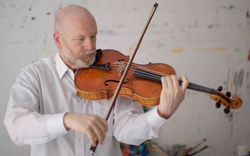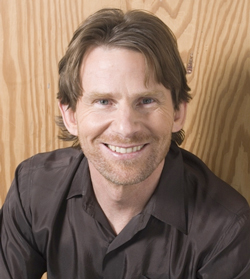by Daniel Hathaway & Mike Telin

Richard Parry: Duo for Heart and Breath
Canadian performer, composer and producer Richard Parry (left) is a core member of the indie band Arcade Fire. Duo is one of a series of works that connect the rhythms of the human body to musical performance.
Tim Munro: “Parry did not write this for us, although it is a very recent piece. We discovered it in a YouTube clip. One of the difficulties of being on the road so much is that we have to hear all of this fantastic new music second or third hand.
“It is an unspeakably beautiful piece. It is literally a duo for heart and breath. Lisa Kaplan, our pianist, plays at the speed of her heartbeat using a stethoscope and Yvonne Lam plays viola at the speed of her in-and-out breaths. It really does feel very intimate, beautiful and fragile — like you’re looking in on an intimate conversation between two lovers or confidants.
“Part of the pleasure of the piece is that every performance is different. Lisa changes chords soon after Yvonne changes notes so it doesn’t have to line up exactly — it just has to be close together so you do get the sense that it is a very organic piece. Sometimes Lisa might have had some caffeine so her heartbeat is quicker but she can play as many chords as necessary based on Yvonne’s breathing, which determines how long the whole piece lasts.”
Brett Dean: Sextet, Old Kings in Exile

Tim Munro: “Brett is a friend and compatriot. I’ve known him for maybe ten years and he’s perhaps Australia’s best-known composer internationally. What I’ve always found with his music is that it’s the perfect mix of head and heart. He’s not somebody who writes simple music but he does write music that is emotionally and dramatically true. He’s always dealing with big subjects and this piece is no exception.
“It was written when he was looking after his father, who was struggling with Alzheimer’s, and it’s sort of his own little emotional roller coaster ride.
“I think you can call the piece night music because the trajectory of the piece is a night filled with hallucinations, nightmares, sleeplessness and anxiety. He does this by using a lot of different interesting and beautiful techniques. For example, the percussionist drags a bouncy rubber super ball along the bass drum and the gong, which creates otherworldly groans. The string players play with serrated paper clips on the lowest strings which produces a very mysterious sound. At times the piece is quite terrifying.
“The end of the piece represents dawn which is evoked by the sound of the pied-butcher bird that he and I both grew up waking to in the morning. It is kinds of a queasy dawn, but there is a sense of hope and moving on.”
Steven Mackey: Suite: Slide

Tim Munro: “The arrangement was a challenge for Steve. First of all he took three of the pieces which are the most instrumentally intricate and have the most diverse and sonically interesting material. And he traded around the voice and with doublings found that it was possible to cover the guitar part.
“But the thing about Steve’s guitar playing is that it’s never guitarlike. I think he is to the guitar what Daniel Barenboim is to the piano — when I hear him he sounds like someone playing the orchestra on the piano. There are all these little instrumental lines and instrumental comments and I feel the same way about Steve’s guitar playing — it’s always about evoking other instruments. So in these arrangements he just makes them manifest more.
“Musically, the recording was one of our favorite projects. Mackey’s a composer who brings a kaleidoscope of different influences and he writes with so much craft and imagination. So we were so excited to be able to do these arrangements.
Listen to excerpts here and here.
Published on ClevelandClassical.com April 26, 2014.
Click here for a printable copy of this article.


